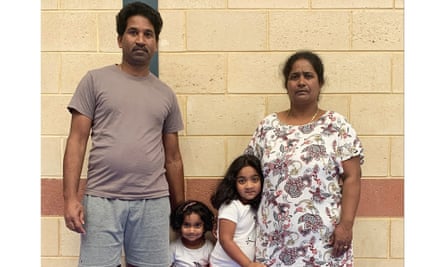Extract from The Guardian
Australian immigration and asylum
Federal government denies that requesting a briefing on the family days before the 2019 election indicated minister was considering allowing Tharunicaa to apply for a visa, court hears.

Last modified on Wed 14 Oct 2020 18.26 AEDT
The federal government has argued that the fact the immigration minister sought a briefing on the Tamil family from Biloela days out from the 2019 election did not indicate he was considering allowing the youngest daughter to apply for a visa.
The full bench of the federal court on Wednesday heard the Coalition’s appeal in the long-running case involving Tamil asylum seekers Priya and Nades and their Australian-born daughters, Kopika and Tharunicaa, who have been detained on Christmas Island since late last year.
The Queensland family is awaiting the outcome of legal proceedings surrounding a visa application for Tharunicaa.
In April, Justice Mark Moshinsky ruled that Tharunicaa had been denied procedural fairness, with evidence showing a brief was prepared for the immigration minister, David Coleman, by the home affairs department in May 2019 outlining he had the power to intervene and lift the bar to allow Tharunicaa and her family to make an application.
Coleman never acted on that brief that was prepared just days before the 2019 federal election.
In appealing Moshinsky’s decision, counsel representing the minister, Stephen Lloyd, told the full bench of the federal court that requesting the brief did not indicate the minister was thinking of lifting the bar and that at the time the brief was requested “the family was the focus of press attention”.
“One might expect that a responsible minister may wish to be apprised of the circumstances pertaining to a family likely to get press coverage,” Lloyd said. “So that may be why he was asking for a full brief.”
Part of the reason it is unclear why Coleman did not act on the brief is he had been on personal leave since the end of last year and was not called to give evidence as to his reasoning in the first trial.
The court heard that while Coleman was still a member of parliament and the minister for immigration he has not voted in parliament since the end of October 2019. Alan Tudge has been acting immigration minister for nearly a year.
Counsel representing the family, Angel Aleksov, said the briefing was “unambiguous” and “the best evidence in this case”. Lloyd objected to the late filing of the claim in February just days before the case was heard but Aleksov said it was obvious at the time where the case was headed once the brief came to light.
“Our opponents are advised by a national law firm, one of the country’s leading juniors and easily one of the country’s leading silk who won a case in the high court not only just today,” Aleksov said. “For them to suggest that they did not understand where the case was going, in our respectful submission, is an ostrich turning her eggs in the nest.”
The appeal had been set down for hearings over two days but was heard in half a day, with justices Geoffrey Flick, Richard White and Natalie Charlesworth insisting both sides not retread over arguments made in written submissions before the hearing. The court reserved its judgment.
No comments:
Post a Comment